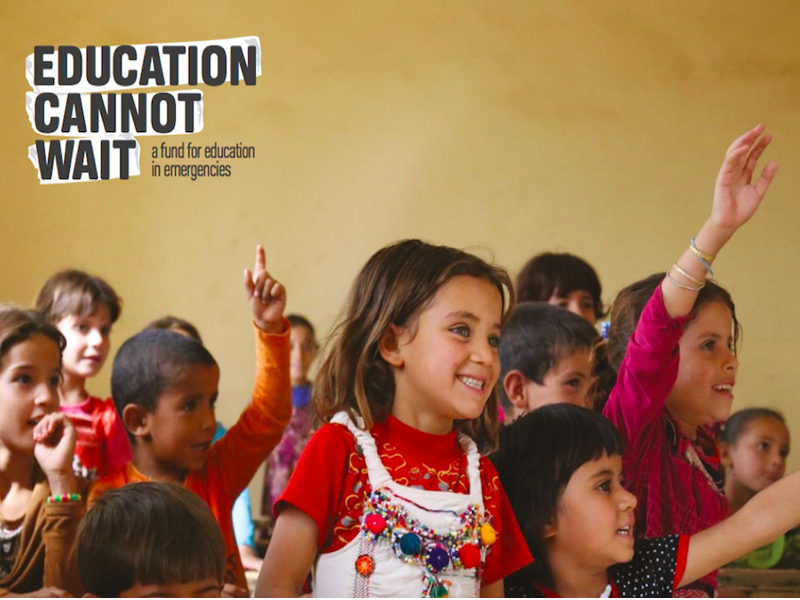NEWS
-
Kenya: Your Invite To The Next Einstein Forum (NEF) 2020 Global Gathering -
African Development Bank and Association for the Development of Education in Africa urge partners to tackle skills mismatch -
STS is the Only Titanium Partner for “Dell Technologies” in Jordan

This week saw the launch of two-multi year resilience programmes to accelerate SDG 4
In just one week, Education Cannot Wait (ECW), with the Governments of Ethiopia and Chad and implementing partners, launched two new multi-year resilience programmes in Chad (7 February) and Ethiopia (14 February) with US$48 million in seed funding over three years to roll out crucial programme activities and catalyse additional resources.
The budgets for these multi-year programmes total US$216 million and thus call for urgent funding to fill the remaining gaps. When fully funded, the programmes will support quality education for approximately 1 million children and youth affected by conflict, forced displacement, protracted crises and impacts of climate change, including droughts and floods.
With the launch of the government-led programmes in Chad and Ethiopia, ECW and its partners have now realized a proven model for advancing humanitarian-development coherence in 10 crisis-affected countries: Afghanistan, Bangladesh, Central African Republic, Chad, Ethiopia, State of Palestine, Somalia, South Sudan, Syria and Uganda.
“In Chad, Ethiopia and other crisis-affected countries, children’s lives have been ripped apart by conflict, forced displacement, climate change impacts and protracted crises. Girls are the most affected and are therefore our top priority. Across these programmes, we must ensure that every child and young person can enjoy their right to inclusive and continued quality education in a protective learning environment – one that caters to all their educational needs and allows them to become who they were meant to be,” said Yasmine Sherif, Director of Education Cannot Wait.
“We must not leave these children behind. They all have the right to develop and thrive. By working together with national governments, UN agencies, donors and other key partners, we are building a global movement to reach these children and to accelerate actions to achieve the Sustainable Development Goals within the UN’s Decade of Action,” continued Sherif.
ECW operates with unprecedented speed and agility in mobilizing partnerships and resources to deliver results for children, helping to advance Sustainable Development Goal 4 – quality inclusive education – for children and youth affected by conflicts, disasters, forced displacement and protracted crises.
In just three years of operation, the Fund has already raised over half a billion dollars and reached over 2.3 million girls and boys, including refugees, internally displaced children, and other children and youth affected by emergencies and protracted crises.
Kickstarting resource mobilization
The programme launches in Chad and Ethiopia kickstart global efforts to fully fund each of the multi-year resilience programmes (MYRPs), and donors are encouraged to help make a transformational difference in the lives of crises-affected children and youth.
In Chad, ECW plans to allocate a total US$21 million over three years in seed funding grants to catalyse the additional US$30 million required to fully fund the three-year programme and reach 230,000 crisis-affected girls and boys.
In Ethiopia, ECW plans to allocate a total US$27 million in seed funding grants to catalyse the additional US$138 million required to fully fund the three-year US$165 million programme and reach approximately 746,000 crisis-affected girls and boys.
The ECW-facilitated MYRPs help bridge the gap between emergency response and long-term development and focus on reaching the most marginalized and vulnerable children and youth, such as girls and children with disabilities. MYRPs are developed on the ground in partnership with a wide range of stakeholders – national governments, UN agencies, donors, private sector and civil society.
Interventions are designed to provide whole-of-child solutions and to reintegrate out-of-school girls and boys into learning and training programmes, improve learning environments, train teachers, improve the governance of the education system in emergency situations, provide psychosocial and school feeding services, support early childhood education and to increase enrolment and retention.
Key facts and figures on Chad
The protracted crisis in Chad has pushed 1.2 million children (aged 6 to 11) out of school. Only 19 per cent of girls and 40 per cent of boys access lower-secondary-school education, and only one out of every ten girls complete middle school. Developed under the auspices of Chad’s Ministry of National Education and Civic Promotion (MENPC) with the support of Education Cannot Wait and a range of UN agencies and international and national civil society partners, the new MYRP focuses on refugee, displaced and host community children and youth and those affected by food insecurity and malnutrition.
Kenya: Your Invite To The Next Einstein
05 March 2020

Education
African Development Bank and Association for the
05 March 2020

Science & Tech
STS is the Only Titanium Partner for
04 March 2020

Business
Dubai: DIFC launches Dh5,500 new licence for
04 March 2020

Business
UK launches second call for proposals for
03 March 2020

Science & Tech
Ministry of Science brings educational fun to
03 March 2020
Share this article
Share on facebook
Share on google
Share on twitter
Share on linkedin
Share on pinterest
Share on print
Share on email

